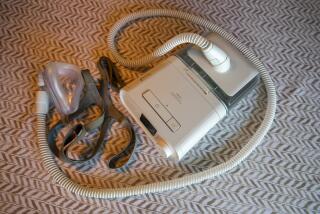Inamed Shares Tumble on Silicone Implant Concerns
- Share via
Investors hammered shares of Inamed Corp. on Thursday after the Food and Drug Administration unexpectedly extended its ban on sales of silicone gel-filled breast implants for cosmetic use.
The stock fell $5.80 to $44 on Nasdaq, a drop of nearly 12%. Analysts said the FDA’s action deflated optimism about the future of Santa Barbara-based Inamed’s implant business.
Last fall, Inamed’s silicone implants were endorsed by an FDA advisory panel, and the agency had been expected to follow the panel’s recommendation and approve the implants. But in a fax to Inamed late Wednesday, the FDA said it needed additional evidence that Inamed’s implants were safe.
Inamed Chief Executive Nicholas L. Teti said Thursday that the company believed it could meet the FDA’s requirements. “This is a setback, but by no means do we see this as the end of the road,” he said during a conference call after the stock market closed.
The FDA effectively pulled silicone implants from the market in 1992 after reports linked them to such chronic diseases as lupus, rheumatoid arthritis and other immune disorders. A barrage of lawsuits were settled for more than $3 billion in 1999, but not before the largest implant company, Dow Corning Corp., filed for bankruptcy protection. Inamed’s share of the settlement totaled $31.5 million
Inamed in October told the FDA that its research, coupled with earlier academic studies, showed that silicone implants were safe. Advocacy groups told the agency that Inamed’s studies did not last long enough to determine whether the implants posed chronic health problems.
Inamed, a medical device company, has other products on the market, including saline and silicone implants. The silicone products are sold in Europe and in the U.S. to breast cancer patients requiring reconstructive surgery.
Inamed posted implant sales of $156.3 million in 2002, about 57% of the firm’s total revenue. Inamed also sells collagen for facial wrinkles and is awaiting FDA approval of another anti-wrinkle treatment, Hylaform.
Analyst Thomas Gunderson of U.S. Bancorp Piper Jaffray said Inamed was a well-managed firm with other opportunities to drive sales and profit growth.
Beside Hylaform, the company is testing its form of botulinum toxin to compete with Allergan Inc.’s Botox. And Inamed’s saline implant business grew 14% through September.
“I think maybe Wall Street made too big a deal of the silicone gel opportunity,” Gunderson said.
Wall Street had expected Inamed to see strong demand for its silicone implants if they were approved for cosmetic use in the U.S. The products are used in 90% of augmentations in Europe, where they have remained generally available.
Inamed and its crosstown rival, Mentor Corp., are the only suppliers of breast implants in the U.S., and the $200-million domestic business is split evenly between them.
Mentor also had been seeking FDA permission to sell silicone implants but was months behind Inamed in the regulatory process. Mentor’s shares rose 26 cents to $24.82 on the New York Stock Exchange.
More to Read
Inside the business of entertainment
The Wide Shot brings you news, analysis and insights on everything from streaming wars to production — and what it all means for the future.
You may occasionally receive promotional content from the Los Angeles Times.









